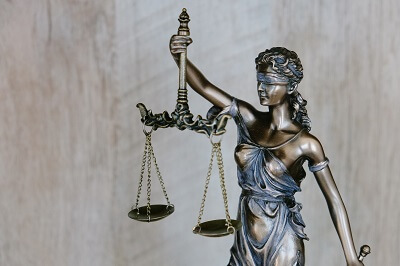Every once in a while, we all end up having to go to the courtroom. Either to appear as part of the proceedings or to show support for friends and family. In the latter case, it’s natural to want to wish someone luck.

Knowing how to wish someone good luck in court isn’t as simple as one might expect. While you can give goodwill when you see them, timing will be everything. However, most of this will depend on whether the judge has called the court into session or not.
Whenever possible, communicate your good wishes before the court date. You can wish a lawyer friend good luck before the hearing, but no witnesses or the judge. A simple “I wish you success!” is sufficient. Refrain from making any comments once the negotiation is underway – even non-verbal ones.
Preliminary Considerations
Generally speaking, it’s always a good idea to wish someone good luck in court before they go or before you enter the courtroom. This way you’ll ensure you won’t be disruptive at any point or commit an infraction on accident.
However, sometimes there are moments where you will want to wish someone good luck because you didn’t get a chance before the moment. It is in these cases that you have to use a little observation and tact. One thing is an absolute certainty: do not be mindless in your approach.
Read the Courtroom Rules Beforehand
First, if you know you won’t be able to say good luck until you get to the courtroom, be sure to study up on the specific rules the courtroom wishes everyone to abide by. Then you want to devise a few scenarios where you’ll be able to say good luck. This will include verbal and nonverbal methods.
Never Make Outbursts or Strange Noises
It’s important to understand that you should never shout, yell, raise your voice, or whistle in court. Even if the judge hasn’t yet come into the room, observe a mode of decorum and silence. If you shout after the judge comes into the room, you can go to jail for disruption.
Consider Courtroom Roles
When you want to wish someone good luck in the courtroom, consider the role they’re playing in the proceedings.
You should never directly address the following person in the courtroom:
- Defendant/Plaintiff
- Attorney
- Judge
- Jury
- Witness
As a good rule of thumb, it’s probably better to give wishes to defendants, plaintiffs, and attorneys than it will be to judges, juries or witnesses. This is because there are strict rules about interacting with the latter three types than the former three.
Accept the Inevitable
Regardless of your best-laid plans for wishing good luck to someone in a courtroom, understand you may not get the chance. If you’re late, the defendant doesn’t notice you, or your attorney friend is busy in conversation, you probably won’t get to say it.
In the case, the courtroom brims full of people, your likelihood of getting a chance to communicate any message of luck may not be successful. This is why it’s best to say it before the case begins.
Wishing Good Luck to the Defendant or Plaintiff
Of everyone in the courtroom, it will be a little easier to wish good luck to the defendant or plaintiff. However, this will very much depend on the court case in question. Plus, you must observe court rules.
Certain Instances
If everyone is still shuffling in and the judge has not yet taken his or her seat, then you can say good luck to a defendant in a civil case or lawsuit.
For criminal cases where you know the offending defendant, you cannot address them directly.
While there may be some exceptions to this, it’s the generally accepted mode of behavior. You will have to wait until they first make eye contact. Even then, simply give a nod and a smile or provide some other nonverbal communication. That will be enough good luck to help them through.
Wishing Good Luck to the Attorney
Attorneys are some of the most peculiar characters in a courtroom. This is because these highly trained professionals cling to superstitions. If you know an attorney you wish to say good luck to, it’s best to understand what their courtroom superstitions are, if they have them, before you do so.
Plus, they’re usually very busy in a courtroom setting.
While it is usually okay to say good luck to the attorney, they are working the room.
They often speak with a host of other people, reading their notes and writing down other things on their legal pads.
This means that if they’re speaking with a bailiff, court reporter, judge, a witness, or some other person, do not interrupt them to wish them good luck. This is especially going to be true once the court is rolling and in session.
Lawyers ; Their Superstitions
Some refuse to acknowledge anyone else in the courtroom other than those involved with the case. Some believe it brings bad luck to talk to someone else.
While not all attorneys are so staunch in their superstitious beliefs, some of them may not appreciate shouting across the room to say good luck.
Wishing Good Luck to a Judge
Don’t wish a Judge good luck in the courtroom.
Don’t address the judge in any capacity. In the event you know the judge handling the case, wish him or her good luck well beforehand. Once the judge has called the court to the session, do not speak at all.
If you know the judge and they nod at you, go ahead and return the sentiment. Otherwise, keep quiet.
Wishing a Member of the Jury or a Witness Good Luck
Don’t wish a member of the jury good luck at any time. Unless you know the person, only wish them luck before their appearance.
Any interaction with the jury at any time during a case may appear as though you’re compromising them.
The same is true for witnesses, especially for those trials that involve murder or other serious crimes. Witness or jury tampering is a federal crime, so you want to avoid incurring this kind of trouble at all costs.
Typical Phrases to Say Good Luck in Court
If you do get to speak to the person you wish good luck, keep your statement short, sweet, and to the point.
Any of the following phrases are acceptable to say to someone in court:
“Best Wishes!”
“Many Blessings!”
“I wish you luck.”
“All the Best!”
“Take Care.”
“God Speed!”
“Fingers Crossed!”
“Wishing you lots of luck.”
“You are going to be amazing.”
“Everything will work out.”
Non-Verbal Ways to Say Good Luck to Someone in a Courtroom
In many cases, once you enter through the doors, you will have to observe a modicum of silence. But, if someone you know is in the proceedings, try any one of the following ways to say good luck without actually verbalizing it:
- Nod and smile; be obvious but also discreet and quick
- Wear a four-leafed clover large enough for the person to see or some other symbol you know has meaning to them
- Hold up both hands with fingers crossed
- Waving hands or fingers (but not obnoxiously)
What Not to Do
When the judge calls court into session, you must remain polite. In other words, be seen and not heard or create a scene. In combination with the advice above, consider the tips below for any situation where you want to wish someone luck in court:
- Avoid inappropriate facial expressions; especially once the judge has called court to order.
- Don’t jump up and down or use obnoxious nonverbal modes of communication. For instance, waving your hands or big signs in the air so all in sundry notice.
- Avoid mouthing words to the person to whom you want to give wishes; this is particularly poignant when the judge is speaking.
- Don’t sigh so loud the whole courtroom can hear you.
- If you are able to speak in the courtroom, whisper your well wishes and don’t shout them.
- Don’t blurt out “good luck” at any time after the judge enters the courtroom.
Final Thoughts
While you may have the best intentions to wish someone good luck in a courtroom setting, there are some things you have to keep in mind. First, certain speech and outbursts can land you in big trouble, especially once the judge enters a courtroom and even more so when the judge calls court into session.
While you can devise some creative nonverbal ways to say good luck, it’s of the utmost importance that you conduct yourself quietly and respectfully. Remember, when in doubt, try to wish the person good luck before the case begins. However, if that’s not possible, try to be as tactful and observant as possible.

Sophie Hammond is a journalist, psychologist, and freelance speechwriter for people in politics and business. She lives on the edge of the Rocky Mountains with her dog and a lifetime supply of books. When she’s not writing, she can be found wandering through nature or journaling at a coffee shop.

